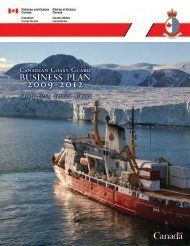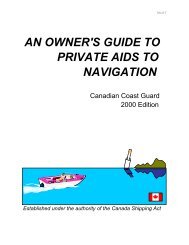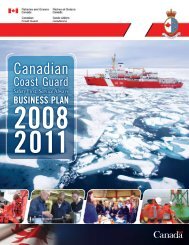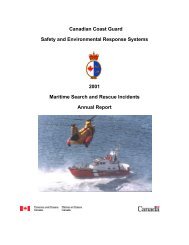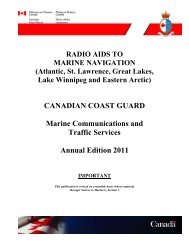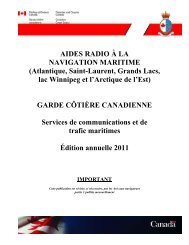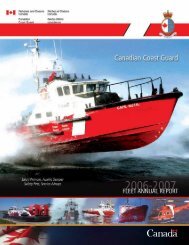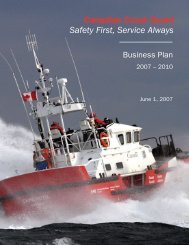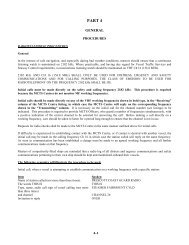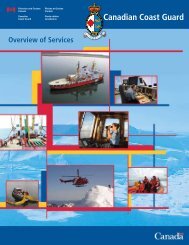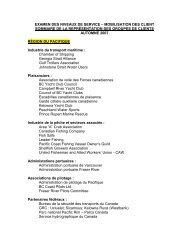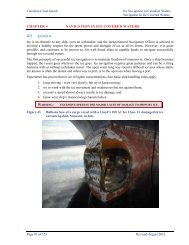RADIO AIDS TO MARINE NAVIGATION - Canadian Coast Guard
RADIO AIDS TO MARINE NAVIGATION - Canadian Coast Guard
RADIO AIDS TO MARINE NAVIGATION - Canadian Coast Guard
Create successful ePaper yourself
Turn your PDF publications into a flip-book with our unique Google optimized e-Paper software.
PART 3<br />
VESSEL TRAFFIC SERVICES (VTS)<br />
PACIFIC AND WESTERN ARCTIC<br />
The purpose of this section is to describe to shipboard personnel the ship reporting procedures to be followed by vessels<br />
within or intending to enter a Vessel Traffic Services Zone.<br />
RESPONSIBILITIES<br />
There is no intention on the part of the CCG to attempt to navigate or manoeuvre ships from a shore station and nothing in<br />
this publication overrides the authority of the master of his responsibility for the safe navigation of his ship. Information<br />
passed to the master is intended to assist him in the safe conduct of his ship.<br />
A Marine Communications and Traffic Services (MCTS) Officer may, under specific circumstances:<br />
(a) direct the master, pilot or person in charge of the deck watch of the vessel to provide any pertinent information in<br />
respect of that vessel that may be specified in the direction;<br />
(b) direct the vessel to use any radio frequencies in communications with coast stations or other vessel that may be<br />
specified in the direction; and<br />
(c) direct the vessel at the time, between the times or before or after any event that may be specified in the direction;<br />
• to leave a VTS Zone,<br />
• to leave or refrain from entering any area within a VTS Zone that may be specified in the direction, or<br />
• to proceed to or remain at any location within a VTS Zone that may be specified in the direction.<br />
A vessel as well as the master, pilot or person in charge of the deck watch of a vessel, shall comply with a direction given<br />
to it or them by an MCTS Officer. Notwithstanding, the master, pilot or person in charge of the deck watch may take any<br />
action that may be required to ensure the safety of life, the ship or any other ship.<br />
The master of a ship shall ensure that before the ship enters a VTS Zone the ship’s radio equipment is capable of receiving<br />
and transmitting radio communications on the appropriate VTS sector frequency.<br />
TRAFFIC CLEARANCE<br />
A "Traffic Clearance" is an authorization for a ship to proceed subject to such conditions as may be included in the<br />
authorization. The traffic clearance is predicated upon ship report information and known waterway/traffic conditions. A<br />
traffic clearance does not eliminate the need for other authorizations required by legislation or by-laws.<br />
Should any factor upon which the traffic clearance is predicated alter to the detriment of safe navigation, the traffic<br />
clearance may be delayed or other conditions may be attached to the traffic clearance.<br />
A Traffic Clearance is required prior to:<br />
• entering a VTS zone;<br />
• commencing a departure manoeuvre;<br />
• commencing a manoeuvre that may be detrimental to safe navigation;<br />
• proceeding after being stranded, stopped due to breakdown of main propulsion machinery or steering gear, or involved<br />
in a collision.<br />
3-1



